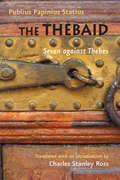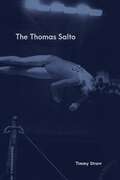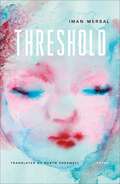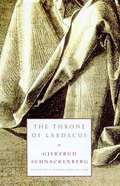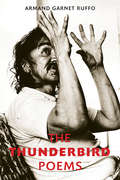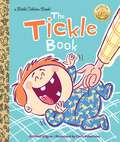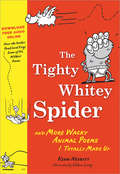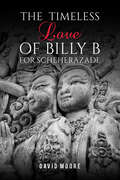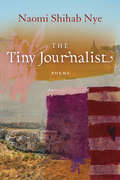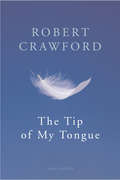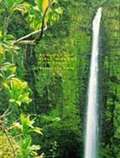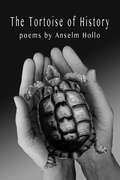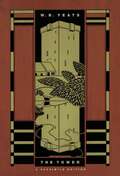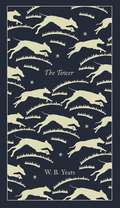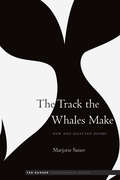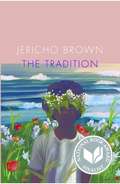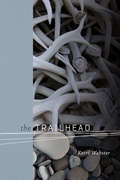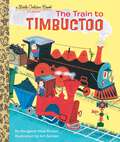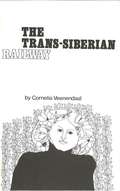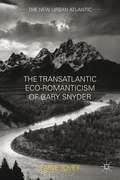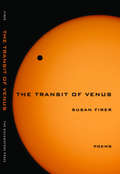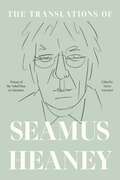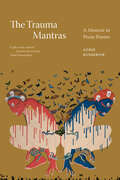- Table View
- List View
The Thebaid: Seven against Thebes (Johns Hopkins New Translations from Antiquity)
by Publius Papinius StatiusA classical epic of fratricide and war, the Thebaid retells the legendary conflict between the sons of Oedipus—Polynices and Eteocles—for control of the city of Thebes. The Latin poet Statius reworks a familiar story from Greek myth, dramatized long before by Aeschylus in his tragedy Seven against Thebes. Statius chose his subject well: the Rome of his day, ruled by the emperor Domitian, was not too distant from the civil wars that had threatened the survival of the empire. Published in 92 A.D., the Thebaid was an immediate success, and its fame grew in succeeding centuries. It reached its peak of popularity in the later Middle Ages and Renaissance, influencing Dante, Chaucer, and perhaps Shakespeare. In recent times, however, it has received perhaps less attention than it deserves, in large part because there has been no accessible, dynamic translation of the work into English.Charles Stanley Ross offers a compelling version of the Thebaid rendered into forceful, modern English. Casting Statius's Latin hexameter into a lively iambic pentameter more natural to the modern ear, Ross frees the work from the archaic formality that has marred previous translations. His translation reinvigorates the Thebaid as a whole: its meditative first half and its violent second half; its intimate portrayal of defeat and retribution, and the need to seek justice at any cost. In a wide-ranging introduction, Ross provides an overview of the poem: its composition, reception and legacy; its major themes and literary influences; and its place in Statius' life. And in a helpful series of notes, he offers background information on the major characters and incidents.
The Thomas Salto
by Timmy StrawThe Thomas Salto takes its name from a difficult and dangerous move in gymnastics, a leaping triple flip popularized during the last years of the Cold War. Both in its Reagan-grained historicity, and in the human body that bears the leap’s flight and risk, the Thomas salto is a kinetic figure for these poems’ action in time and space. They shadow the AIDS epidemic, the war on drugs, the US proxy wars in Central America, Afghanistan, and the Middle East, the Soviet collapse—not as history but as the camouflage-pattern of “then” and “to come” which form the flickering and very real habitus of the present.
The Threshold: Poems
by Iman MersalA selection of luminous, fiercely intelligent verse from Egypt’s premier poet. Iman Mersal is Egypt’s—indeed, the Arab world’s—great outsider poet. Over the past three decades, she has crafted a voice that is ferocious and tender, street-smart and vulnerable. Her early work captures the energies of Cairo’s legendary literary bohème, a home for “Lovers of cheap weed and awkward confessions / Anti-State agitators” and “People like me.” These are poems of wit and rage, freaked by moments of sudden beauty, like “the smell of guava” mysteriously wafting through the City of the Dead. Other poems bear witness to agonizing loss and erotic temptation, “the breath of two bodies that never had enough time / and so took pleasure in their mounting terror.” Mersal’s most recent work illuminates the trials of displacement and migration, as well as the risks of crossing boundaries, personal and political, in literature and in life.The Threshold gathers poems from Mersal’s first four collections of poetry: A Dark Alley Suitable for Dance Lessons (1995), Walking as Long as Possible (1997), Alternative Geography (2006), and Until I Give Up the Idea of Home (2013). Taken together, these works chart a poetic itinerary from defiance and antagonism to the establishment of a new, self-created sensibility. At their center is the poet: indefatigably intelligent, funny, flawed, and impossible to pin down. As she writes, “I’m pretty sure / my self-exposures / are for me to hide behind.”
The Throne of Labdacus
by Gjertrud SchnackenbergThe Throne of Labdacus is Gjertrud Schnackenberg's lyric telling of Oedipus' story, and of "what happens outside the play", through the experience of the god who is its presiding oracle: Apollo. The god of poetry, music, and healing is given the task of setting the Sophocles text to music and is woven reluctantly into its world of riddles, unanswered questions, partially disclosed oracles, and hearsay -- a world where the gods, as much as humans, are bound by fate and necessity.
The Thunderbird Poems
by Armand Garnet RuffoNorval Morrisseau's revered work has been honoured, copied and recognized throughout the art world and beyond. Less widely known but equally captivating is the artist's personal life story, which poet and biographer Armand Garnet Ruffo related in his powerful narrative biography, Norval Morrisseau: Man Changing into Thunderbird (Douglas & McIntyre, 2014). Ruffo immersed himself in the life and work of the artist, gaining insight into the struggles and sources of inspiration underlying Morrisseau's greatest works through research and interviews with the artist himself-a connection further strengthened by their shared Ojibway heritage. His lengthy study of Morrisseau inspired Ruffo to write poems reflecting on both the works of art and the emotional context in which Morrisseau painted them. Thunderbird Poems complements the highly evocative and poetic biography, delving into Morrisseau's creative life through compressed, imagistic language, while untangling the complex and powerful threads of meaning, tradition and emotional power that resonate throughout Morrisseau's strong lines and vibrant colours. Significant themes in Morrisseau's work are mirrored in Thunderbird Poems: Ojibway legends, Morrisseau's conflicted religious beliefs, political tensions between white and aboriginal Canadians. Significant moments in Morrisseau's life are also traced along with the development of his artistic career. Deeply immersed in Morrisseau's life story, and possessing thorough knowledge of the Ojibway storytelling traditions which grounded so much of the artist's beliefs and creativity, Ruffo provides fresh poetic interpretations of the most renowned and striking works of one of Canada's most celebrated painters.
The Tickle Book (Little Golden Book)
by Heidi KilgrasThis Little Golden Book about tots and tickles makes a perfect gift for all ages!Whether it&’s a tummy tickle from Mom, an armpit tickle from Dad, or a whisker tickle from a pet, gigglers of all ages will be endlessly entertained and eager to spend quality tickle time with this book.
The Tighty Whitey Spider
by Kenn NesbittIt's Official: Kids want more of Kenn Nesbitt's sidesplitting poetry. They can't get enough of his clever wordplay, wonderful imagery, and zany rhymes. In this brand-new collection, Kenn has totally made up over fifty poems involving Acrobatic Cats, Kung Fu Pets, and Chickens on Computers.
The Timeless Love of Billy B for Scheherazade
by David MooreBalthazar dreams of the perfect woman, one he can summon or dismiss at will on his computer screen. But as time passes, he becomes ensnared in his own creation, consumed by an obsession with this non-existent figure. As Balthazar spirals downward, losing everything from his identity to the use of his body, reduced to just his mind and the fingers tapping at the keyboard, she, in contrast, rises. She transforms into a modern-day Scheherazade, learning to command her prince.Baltha B was unaware,No more sits he upon the chair.The relics of his body&’s ruin,Are the one last bastionOf his undoing.Death beckons when the hands they clap,To say, &‘Enough! Your time is up&’
The Tiny Journalist (American Poets Continuum Series #170)
by Naomi Shihab Nye“A moving testament to the impact one person can have and the devastating effects of occupation.” —Washington Post Best Poetry Books of 2019 Internationally beloved poet Naomi Shihab Nye places her Palestinian American identity center stage in her latest full-length poetry collection for adults. The collection is inspired by the story of Janna Jihad Ayyad, the "Youngest Journalist in Palestine," who at age 7 began capturing videos of anti-occupation protests using her mother's smartphone. Nye draws upon her own family's roots in a West Bank village near Janna's hometown to offer empathy and insight to the young girl's reporting. Long an advocate for peaceful communication across all boundaries, Nye’s poems in The Tiny Journalist put a human face on war and the violence that divides us from each other.
The Tip Of My Tongue
by Robert CrawfordRobert Crawford's new collection is an exhilarating celebration of the world he lives in: his family, his fellow Scots, his country and his country's languages. Beginning with a group of moving, renewing love poems to his wife, the book builds into a polyphonic hymn to life in all its aspects. There is a powerful sense of communion and connection in The Tip of My Tongue: while singing the Scottish part of the planet, Crawford also embraces the rhythms of the whole circumference - from Perth, Scotland, to Perth, Australia - catching 'how Kincardineshire's sky's/Transvaalish, Budapesty, Santa Barbaran,/Zurich on a perfect day'. These are poems that are convincingly earthed in the land and the language yet unafraid of spiritual, even religious notes; richly lyrical and passionate yet shot through with a humour and a vitality that is utterly engaging. As Liam McIlvanney wrote in the Sunday Herald, 'for intellectual range, emotional depth, and lexical shimmer, Crawford is unsurpassed among recent Scottish poets'.
The Top 500 Poems
by William HarmonThe top 500 poems written in the English language, chosen by the editor by selecting based on which poems have been most anthologized elsewhere. Poems have been completely formatted by a sighted proofreader with the needs of blind readers in mind, with all formatting and stanza breaks preserved and matched to the original printed poetry.
The Tortoise of History
by Anselm HolloFrom "Art History":Someone comes alonggives that tedious old thinga new twist orbreaks its neckthe old questionsdon't change:what do you want me to say?what do you want me to do?Anselm Hollo (1934-2013) authored more than forty books and was an award-winning translator. Born in Helsinki, Finland, he was fluent in German, Swedish, Finnish, and English by age ten. Hollo eventually settled in the United States in 1966, where he taught at Naropa University in Boulder, Colorado.
The Tower: A Facsimile Edition (Yeats Facsimile Edition Series)
by William Butler YeatsThe first edition of W. B. Yeats's The Tower appeared in bookstores in London on Valentine's Day, 1928. His English publisher printed just 2,000 copies of this slender volume of twenty-one poems, priced at six shillings. The book was immediately embraced by book buyers and critics alike, and it quickly became a bestseller. Subsequent versions of the volume made various changes throughout, but this Scribner facsimile edition reproduces exactly that seminal first edition as it reached its earliest audience in 1928, adding an introduction and notes by esteemed Yeats scholar Richard J. Finneran. Written between 1912 and 1927, these poems ("Sailing to Byzantium," "Leda and the Swan," and "Among School Children" among them) are today considered some of the best and most famous in the entire Yeats canon. As Virginia Woolf declared in her unsigned review of this collection, "Mr. Yeats has never written more exactly and more passionately."
The Tower: Manuscript Materials (Penguin Clothbound Poetry)
by W B YeatsA collectible new Penguin Classics series: stunning, clothbound editions of ten favourite poets, which present each poet's most famous book of verse as it was originally published. Designed by the acclaimed Coralie Bickford-Smith and beautifully set, these slim, A format volumes are the ultimate gift editions for poetry lovers. The Tower was W. B. Yeats's first major collection of poetry as Nobel Laureate after the receiving the Nobel Prize in 1923. It is considered to be one of his most influential collections. The title refers to Thoor Ballylee Castle, a Norman tower that Yeats purchased in 1917 and later restored. The Tower includes some of his greatest and most innovative poems including 'Sailing to Byzantium', a lyrical meditation on man's disillusionment with the physical world; 'Leda and the Swan', a violent and graphic take on the Greek myth of Leda and Zeus and 'Among School Children', a poetic contemplation of life, love and the creative process.
The Track the Whales Make: New and Selected Poems (Ted Kooser Contemporary Poetry)
by Marjorie SaiserMarjorie Saiser&’s strong, clear language makes the reader feel at home in her poems. Dealing with all the ways love goes right and wrong, this collection honors the challenges of holding firm to who we really are, as well as our connections to the natural world.The Track the Whales Make includes poems from Saiser&’s seven previous books, along with new ones. Her poetry originates from the everyday things we might overlook in the hurry of our daily routines, giving us a chance to stop and appreciate the little things, while wrapped in her comforting diction. Because the poems come from ordinary life, there is humor alongside happiness and sadness, the mixed bag we survive or create, day by day.
The Tradition
by Jericho BrownThe Tradition details the normalization of evil and its history at the intersection of the past and the personal. Brown’s poetic concerns are both broad and intimate, and at their very core a distillation of the incredibly human: What is safety? Who is this nation? Where does freedom truly lie? Brown makes mythical pastorals to question the terrors to which we’ve become accustomed, and to celebrate how we survive.
The Trailhead (Wesleyan Poetry Series)
by Kerri Webster“I'm learning to allow for visions,” the primary speaker of The Trailhead announces, setting out through a landscape populated by swan-killers, war torturers, and kings. Much of the book takes place in the contemporary American West, and these poems reckon with the violence inherent in that place. A “conversion narrative” of sorts, the book examines the self as a “burned-over district,” individual and cultural pain as a crucible in which the book’s sibyls and spinsters are remade, transfigured. "Sacralization/is when things become holy, also/when vertebrae fuse," the book tells us, pulling at the tensions between secular and sacred embodiment, exposing the essential difficulty of being a speaking woman. The collection arrives at a taut, gendered calling—a firm faith in the power and worth of the female voice—and a broader faith in poetry not as a vehicle of atonement or expiation, but as bulwark against our frailties and failings.
The Train to Timbuctoo (Little Golden Book)
by Margaret Wise BrownBack in print for a new generation, a rollicking, rhyming train tale from the author of Goodnight Moon!From Kalamazoo to Timbuctoo, from Timbuctoo and back!This beloved story from 1951, about a big train and a little train that have just left Kalamazoo, has captured the imaginations of generations of children. Out of print for decades, it is back to delight little ones and their parents and grandparents again. "Clackety-clack—clackety-clack—pocketa-pocketa-pocketa"—down the track they go! Now a new generation of children will pore over the cheerful illustrations of bridges, tracks, and countryside, while listening to this rollicking tale.
The Trans-Siberian Railway
by Cornelia Veenendaal"There is a sweetness in the voice of these poems, an abstemious poignancy, that strikes to the heart again and again... Intensity is the word for this poet: not the familiar, big muscled sort, but as silence in meditation defines the intense." --Barry Spacks
The Transatlantic Eco - Romanticism Of Gary Snyder
by Paige ToveyTracing connections between Gary Snyder and his Romantic and Transcendentalist predecessors - Wordsworth, Blake, Emerson, Whitman, and Thoreau - this study explores the tension between urbanization and overindustrialization. The dialectical relationship between Snyder and his predecessors reminds readers that nature is never a simple concept.
The Transit of Venus
by Susan FirerIn Firer's poems, place, often the western shore of Lake Michigan, provides an imagistic and sonic landscape in which language explores the 'empire of skin' with its daily happinesses and sorrows, gifts and losses. Often blue light illuminates these poems and frequently the language of a Catholic childhood shows up. Ezra Pound and William Carlos Williams's poems say 'Use everything,' and Firer does: receipts, anatomy, astronomy, clothes poles, paintings, checklists, quagga mussels, questions and grapefruit. Birds fly through these poems, insights too: 'For a minute / we are disguised / as human.' That quote concisely sums up Firer's main attentions: transience and time and with what and how we fill our brief time here on earth.
The Translations of Seamus Heaney
by Seamus HeaneyThe complete translations of the poet Seamus Heaney, a Nobel laureate and prolific, revolutionary translator. Seamus Heaney’s translation of Beowulf, published in 1999, was immediately hailed as an undisputed masterpiece, “something imperishable and great” (James Wood, The Guardian). A few years after his death in 2013, his translation of Virgil’s Aeneid Book VI caused a similar stir, providing “a remarkable and fitting epilogue to one of the great poetic careers of recent times” (Nick Laird, Harper’s Magazine). Now, for the first time, the poet, critic, and essayist’s translations are gathered in one volume. Heaney translated not only classic works of Latin and Old English but also a great number of poems from Spanish, Romanian, Dutch, Russian, German, Scottish Gaelic, Czech, Ancient and Modern Greek, Middle and Modern French, and Medieval and Modern Italian, among other languages. In particular, the Nobel laureate engaged with works in Old, Middle, and Modern Irish, the languages of his homeland and early education. As he said, “If you lived in the Irish countryside as I did in my childhood, you lived in a primal Gaeltacht.” In The Translations of Seamus Heaney, Marco Sonzogni has collected Heaney’s translations and framed them with the poet’s own writings on his works and their composition, sourced from introductions, interviews, and commentaries. Through this volume, we come closer to grasping the true extent of Heaney’s extraordinary abilities and his genius.
The Trauma Mantras: A Memoir in Prose Poems
by Adrie KusserowThe Trauma Mantras is a memoir by medical anthropologist, teacher, and writer Adrie Kusserow, who has worked with refugees and humanitarian projects in Bhutan, Nepal, India, Uganda, South Sudan, and the United States. It is a memoir of witness and humility and, ultimately, a way to critique and gain a fresh perspective on Western approaches to the self, suffering, and healing. Kusserow interrogates the way American culture prizes a psychologized individualism, the supposed fragility of the self. In relentlessly questioning the Western tribe of individualism with a hunger to bust out of such narrow confines, she hints at the importance of widening the American self. As she delves into humanity’s numerous social and political ills, she does not let herself off the hook, reflecting rigorously on her own position and commitments. Kusserow travels the world in these poetic meditations, exploring the desperate fictions that “East” and “West” still cling to about each other, the stories we tell about ourselves and obsessively weave from the dominant cultural meanings that surround us.
